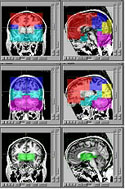

|
Brain Studies
|
A
continuing education course
Each
section is 1 - 2 ce,
or you may take the entire
course for 30 ces
As the field of psychology understands the importance of neuroscience, www.psychceu.com is pleased to announce a series of courses on the brain, written by leading researchers. Contents include: Introduction:
Development:
Specific Neurological Conditions:
|

|
Learning
Objectives
|
Resources: |
We do adhere to the American Psychological Association's Ethical Principles of Psychologists. Our courses are carefully screened by the Planning Committee to adhere to APA standards. We also require authors who compose Internet courses specifically for us follow APA ethical standards. Many of our courses contain case material, and may use the methods of qualitative research and analysis, in-depth interviews and ethnographic studies. The psychotherapeutic techniques depicted may include play therapy, sandplay therapy, dream analysis, drawing analysis, client and therapist self-report, etc. The materials presented may be considered non-traditional and may be controversial, and may not have widespread endorsement within the profession. www.psychceu.com maintains responsibility for the program and its content. |
All material included in this course is either in the public domain, or used with express permission. |
![]()
Cost
of each 1 unit course is $12
Cost
of the 30 unit course is $300
(a
savings of $60)